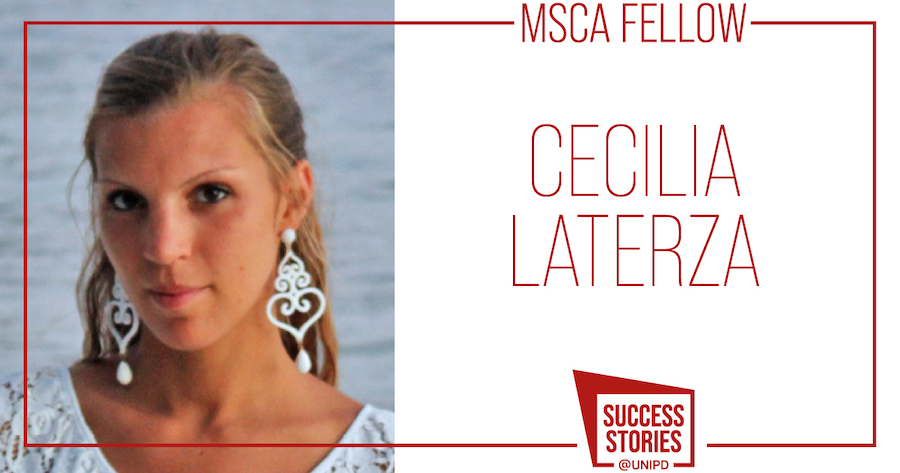
MSCA Fellow: Cecilia Laterza
Cecilia discovered that changing perspective is always a good idea: she has switched from biotechnology labs to an engineering one to better understand the disease-modelling, she has also worked on transplantation of stem cells as a therapeutic strategy for neurological disease and to develop new skills.

Cecilia Laterza is an Italian neuroscientist. Her scientific interests span from stem cell biology, regenerative medicine, re-programming and in vitro modelling of neurological diseases. Cecilia studied medical biotechnologies at the University of Padua, then she moved to Vita-Salute San Raffaele University, in Milan, where she received her PhD in experimental neurology in 2013. Her PhD dealt with induced pluripotent stem cell (iPSC)-based therapy in the experimental model of multiple sclerosis and in vitro modeling of multiple sclerosis, starting from patient’s skin cells re-programmed and differentiated into brain cells.
You won a Marie Curie Individual Fellowship, started in September 2019 and ending in August 2021. Can you tell us something about your research path so far and why you chose to apply for a MSCA-IF?
I studied medical biotechnology in Padua, but I’ve always loved the idea of having the opportunity to look around, travel, get in contact with people and build experiences in different countries. I think the world of research is really great also because of this. I did my Master Thesis in London where I got to know stem cells and started to be interested in this field. After my graduation I moved to Milan, also for personal reasons, and I started a PhD in stem cells applied to neuroscience in the neuroimmunology lab at San Raffaele University. When I finished my PhD I was really in love with stem cells and stem cell therapy, but I felt I was missing something, so I decided to move again and I went to Sweden to gain another point of view both on science and life. I met very great scientists and friends at Lund University, where I spent more than 2 years. Then, thinking of my career path, I wanted to start something more independently and I thought a Marie Sklodowska Curie Fellowship was a great opportunity. I’ve been very lucky because I’ve always managed to cope working and traveling with personal life and I have to thank my husband for this.
How did you choose your Host Institution?
Before applying I started looking around, because it’s important to have connections and a detailed project plan before applying for such a competitive grant. And again for personal reasons, but also because I knew Padua University and the great research they do here, I decided to look into Padua and I found a very interesting lab which I felt was perfect for my profile and interests, because I would have been able to develop skills I didn’t have at that time. So I chose Professor Elvassore’s lab, who is actually a stem cell engineering lab, so really different from what I was doing. I applied with him for a MSCA-IF Grant. The first time I was not successful. But then I tried again and the second time I got the Fellowship.
How did you change your project before the resubmission?
I found really useful to participate in the MSCA MaRaThoN organised by Unipd. It's a great opportunity to meet MSCA experts and to understand which are the crucial points to highlight in your project proposal. Moreover I had a friend working on a complete different field that won a MSCA-IF and kindly shared with me her application. Having a positive control is always a winning strategy in science!
What was the peculiarity of your supervisor’s lab that convinced you to apply here?
I was working on the transplantation of stem cells as a therapeutic strategy for neurological disease, but I wanted to investigate more the disease-modelling part. Professor Elvassore is an engineer and he developed breakthrough techniques, like microfluidics and new technologies that allow to ameliorate stem cell differentiation in 3D. It was science fiction for me, because I was working more in a preclinical environment. And at the same time I was really excited because I had the opportunity to combine multiple interests and topics in one lab, where engineers, biologists, chemists all work together for the same aim. I also knew that Padua University was a great environment. The International Research Office gave me a lot of support both before and after the application, even now they always help me in all the procedures I have to fulfill.
What about this interdisciplinarity, is it an important aspect for a MSCA research project?
I think it is not crucial. If you don’t have it, I don’t think you won’t get the Grant. But I think that nowadays it is really important to combine different levels of expertise. And I believe it is still quite rare, so if you find a lab that allows you to implement different aspects of your research it’s something you really want to pursue. So it might provide an additional value to your research.
You work on induced pluripotent stem cells applied to biological models of a mental disorder. There is also a social relevance in your research, is it an important feature for a MSCA project proposal?
Definitely, my project deals with in-vitro modeling of a neurodevelopmental disorder. The fragile X syndrome is the main genetic cause of mental disability. When I was applying for the IF I was paying attention to the European Commission needs and interests. There are various topics of interest and one of those is in neurological diseases. So if I can give a suggestion to people who wish to apply, take always in consideration the topics and the important aspects that the European Commission wants to investigate.
Is it also important to show how much your research proposal allows you to strengthen your professional profile?
Yes, this is very important because the main aim of the MSCA-IF is to give you the chance to make a step forward in your career and to acquire independence. This allows you to boost many aspects of your CV, not only publications, but also your grant managing abilities, creating new connections with new groups and acquiring skills in many fields that you will need when you will be a P. I.
International Research Office
via Martiri della libertà 8, 35137 Padova, Italy
tel. +39 049.827 1947 / 1948 / 1945
fax +39 049.827 1911
international.research@unipd.it


